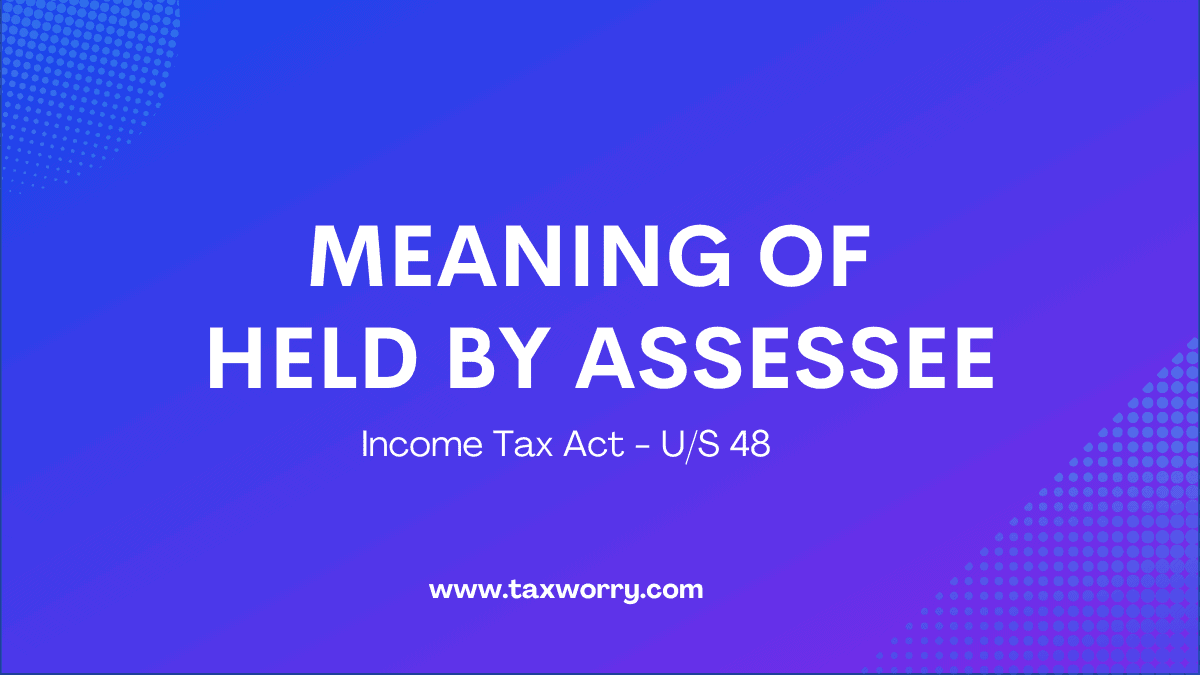Meaning of tax terms
Meaning of “Held by assessee”
The meaning of held by assessee under section 48 of the Income Tax Act is not defined in the act itself. But we can take guidance from decisions by various high courts. Here are excerpts of courts orders in which the Hon’ble High Court tried to explain the meaning of held by assessee.

Meaning of held by assessee
The phrase “held by assessee” used in section 48 of the Income Tax Act came up before various high courts as detailed under :
1. Hon’ble Bombay high court explained the meaning of “held by assessee” while delivering judgment in CIT Vs. Manjula J. Shah [2011] 16 taxmann.Com 42 as under :
Meaning : In construing the words ‘asset was held by the assessee’ in clause (iii) of explanation to section 48, one has to see the object with which the said words are used in the statute. If one reads explanation 1(i)(b) to section 2(42a) together with sections 48 and 49, it becomes absolutely clear that the object of the statute is not merely to tax the capital gains arising on transfer of a capital asset acquired by an assessee by incurring the cost of acquisition,
but also to tax the gains arising on transfer of a capital asset inter alia acquired by an assessee under a gift or will as provided under section 49 where the assessee is deemed to have incurred the cost of acquisition. Therefore, if the object of the legislature is to tax the gains arising on transfer of a capital acquired under a gift or will by including the period for which the said asset was held by the previous owner in determining the period for which the said asset was held by the assessee,
then that object cannot be defeated by excluding the period for which the said asset was held by the previous owner while determining the indexed cost of acquisition of that asset to the assessee. In other words, in the absence of any indication in clause (iii) of the explanation to section 48 the words ‘asset was held by the assessee’ has to be construed differently. The said words should be construed in accordance with the object of the statute, that is, in the manner set out in explanation 1(i)(b) to section 2(42a).
2. Hon’ble Delhi high court explained the meaning of “held by assessee” while delivering judgment in Arun Shungloo Trust Vs. Cit [2012] 18 taxmann.Com 261/205 taxman 456/249 ctr 294 (delhi) as under :
Meaning : The expression ‘held by the assessee’ used in explanation (iii) to section 48 has to be understood in the context and harmoniously with other sections. The cost of acquisition stipulated in section 49 means the cost for which the previous owner had acquired the property. The term ‘held by the assessee’ should be interpreted to include the period during which the property was held by the previous owner.
3. Hon’ble Karnataka high court explained the meaning of “held by assessee” while delivering judgment in CIT Vs. Smt. Kaveri Thimmaiah [2014] 49 taxmann.Com 545/369 itr 81 (kar.) as under :
Meaning : The words used are, “in which the asset was held by the assessee”, a harmonious reading of sections 48 and 49 makes it clear for the purpose of “indexed cost of acquisition”, it has to be understood as the first year in which the previous owner held the said property. Otherwise, if the date of inheritance is taken into consideration, then the cost of acquisition of the asset on that date corresponding to the market value is to be taken into consideration.
Otherwise, take the cost of acquisition on the day the previous owner acquired it and apply the “indexed cost of acquisition” and then calculate the capital gains and the tax payable. That is precisely what has been held by the bombay high court in cit v. Manjula j. Shah [2013] 355 itr 474/[2012] 204 taxman 691/[2011] 16 taxmann.Com 42 which in our view is the correct legal decision.
Hon’ble Karnataka high court explained the meaning of “held by assessee” while delivering judgment in Cit Vs. Smt. Daisy Devaiah [2014] 50 taxmann.Com 234/227 taxman 153 (mag.)(Kar.) as under :
Meaning : Though in the definition of ‘indexed cost of acquisition’, the words used are, ‘in which the asset was held by the assessee, a harmonious reading of sections 48 and 49 makes it clear that, for the purpose of ‘indexed cost of acquisition’, it has to be understood as the first year in which the previous owner held the said property. Otherwise, if the date of inheritance is taken into consideration,
then the cost of acquisition of the asset on that date corresponding to the market value is to be taken into consideration. Otherwise, take the cost of acquisition on the day the previous owner acquired it and apply the ‘indexed cost of acquisition’ and then calculate the capital gains and the tax payable. That is precisely what has been held by the bombay high court in cit v. Manjula j. Shah [2011] 16 taxmann.Com 42/[2012] 204 taxman 691/[2013] 355 itr 474 which is the correct legal decision.
In this article, you can get guidance from high courts on the meaning of held by assessee under Section 48 of the Income Tax Act.
Updated up to Finance Act 2021.
